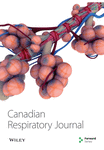Anti-inflammatory effects of salmeterol compared with beclomethasone in eosinophilic mild exacerbations of asthma: A randomized, placebo controlled trial
Abstract
BACKGROUND: Salmeterol is a potent long acting beta-agonist that is effective in relieving the symptoms and airflow limitation of asthma.
OBJECTIVE: To determine whether the effect of salmeterol on clinical parameters in a mild eosinophilic exacerbation of asthma was similar to that of beclomethasone dipropionate (BDP) and, thus, is due to an anti-inflammatory property.
PATIENTS AND METHODS: Thirty-four asthmatics with a persistent increase in symptoms for at least two weeks and an increase of sputum eosinophils of 4% or more were randomized in a double-blind fashion to one of three groups that received daily treatment with 100 µg salmeterol, 1 mg BDP or placebo in divided doses using identical pressurized inhalers. Patients were treated with study medications for three weeks, followed by one week of open label BDP (500 µg bid). Patients were seen at weekly intervals, and sputum and blood were obtained on each visit. The primary outcome measure was a change in sputum eosinophils, and secondary outcomes were changes in blood eosinophils, eosinophilic cationic protein (ECP) and clinical parameters. Three patients (one in each group) could not produce any sputum after randomization and were excluded from the analysis.
RESULTS: Twelve patients received salmeterol, 10 received BDP and nine received placebo. Salmeterol treatment had no effect on sputum eosinophils geometric mean, (from 35.5 [24.9] to 26.9% [25.8]), blood eosinophils (from 7.6 [4.8] to 7.2% [3.9]) or ECP (from 33.1 [18.1] to 27.8 [16.3] mg/L) but improved morning peak expiratory flow (PEF) and diurnal variation of PEF, and decreased the use of rescue medication more than placebo (P<0.05 for all comparisons). In contrast, BDP improved both inflammatory indexes (sputum eosinophils from 22.5 [17.9] to 5.7% [6.8], blood eosinophils from 9.0 [5.5] to 2.1% 1.0, and serum ECP from 36.5 [22.0] to 16.1 [10.1] mg/L) as well as clinical parameters.
CONCLUSIONS: These results show that salmeterol improves the symptoms and airway function of patients with asthma, but has no effect on eosinophilic airway infiltration. These findings support current asthma guidelines, which recommend the initial use of inhaled steroid to maximize clinical improvement. While salmeterol also produces clinical improvement, it does not suppress sputum eosinophilia. The analysis of induced or spontaneous sputum for inflammatory indexes may be a valuable clinical test to guide the use of inhaled steroid and/or a long acting beta-agonist.




